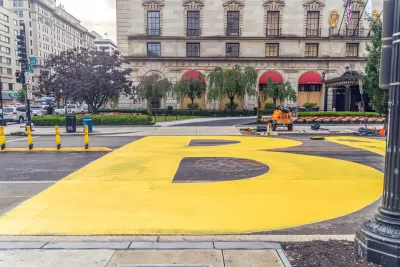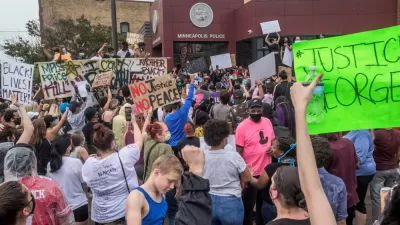Complex political dynamics are mustering for a showdown over D.C.'s comprehensive plan.

Paul Schwartzman reports on the growing coalition fighting for racial equity as Washington, D.C. prepares to consider a comprehensive plan update.
Schwartzman describes the plan as "Mayor Muriel E. Bowser’s proposed changes to zoning policy"—reserving the words "comprehensive plan" for later in the article.
"The revisions would allow taller apartment buildings on key corridors, potentially catalyzing the construction of tens of thousands of housing units, a portion of them subsidized," explains Schwartzman. Moreover, "Under the revised policy, developers would have to devote up to 20 percent of square footage to below-market units — in some cases, more than double the existing requirement."
A key angle of Schwartzman's coverage is the growing awareness of zoning as a racial issue—and the growing work of advocates pushing to allow more space develop in wealthy neighborhoods to right past racial injustices. Like in almost every large city in the United States—not everyone in the District agrees that upzoning is the right tool for racial justice.
“In the name of racial equity, they’re pushing a program that will continue to displace Black people from D.C.,” said Parisa Norouzi, executive director of Empower DC, an advocacy group. “All these people want is to sprinkle the word equitable into things that aren’t equitable. It’s all smoke and mirrors.”
Then there are other opponents, who resist the potential of the zoning changes to change the character of their neighborhoods.
“You’re going to have a serious impact on the character and nature of our community,” Bonnie LePard, a member of the Cleveland Park Historical Society, said at the recent neighborhood meeting, which drew nearly 200 viewers. She added that the new buildings threatened to turn the corridor into a “canyon.”
The article includes a lot more detail about the history of zoning and development in D.C., and the various advocacy organizations working to influence the District's comprehensive plan update process.
FULL STORY: How George Floyd’s death is fueling a push for affordable housing in mostly White parts of D.C.

Planetizen Federal Action Tracker
A weekly monitor of how Trump’s orders and actions are impacting planners and planning in America.

Maui's Vacation Rental Debate Turns Ugly
Verbal attacks, misinformation campaigns and fistfights plague a high-stakes debate to convert thousands of vacation rentals into long-term housing.

San Francisco Suspends Traffic Calming Amidst Record Deaths
Citing “a challenging fiscal landscape,” the city will cease the program on the heels of 42 traffic deaths, including 24 pedestrians.

Defunct Pittsburgh Power Plant to Become Residential Tower
A decommissioned steam heat plant will be redeveloped into almost 100 affordable housing units.

Trump Prompts Restructuring of Transportation Research Board in “Unprecedented Overreach”
The TRB has eliminated more than half of its committees including those focused on climate, equity, and cities.

Amtrak Rolls Out New Orleans to Alabama “Mardi Gras” Train
The new service will operate morning and evening departures between Mobile and New Orleans.
Urban Design for Planners 1: Software Tools
This six-course series explores essential urban design concepts using open source software and equips planners with the tools they need to participate fully in the urban design process.
Planning for Universal Design
Learn the tools for implementing Universal Design in planning regulations.
Heyer Gruel & Associates PA
JM Goldson LLC
Custer County Colorado
City of Camden Redevelopment Agency
City of Astoria
Transportation Research & Education Center (TREC) at Portland State University
Jefferson Parish Government
Camden Redevelopment Agency
City of Claremont





























